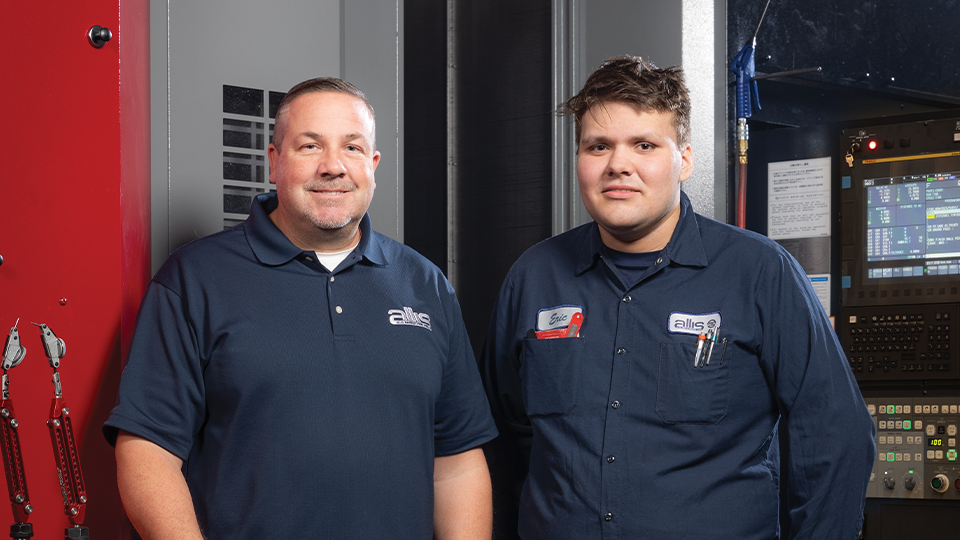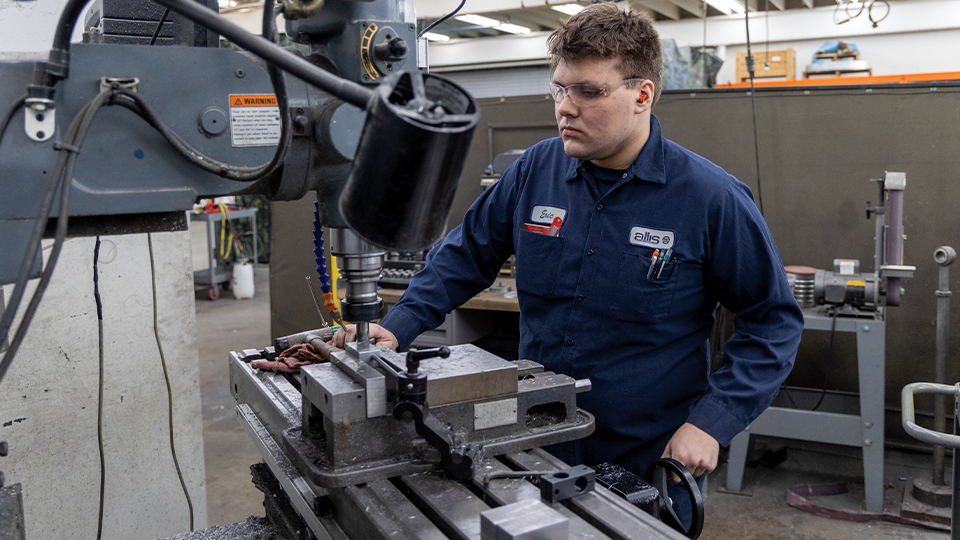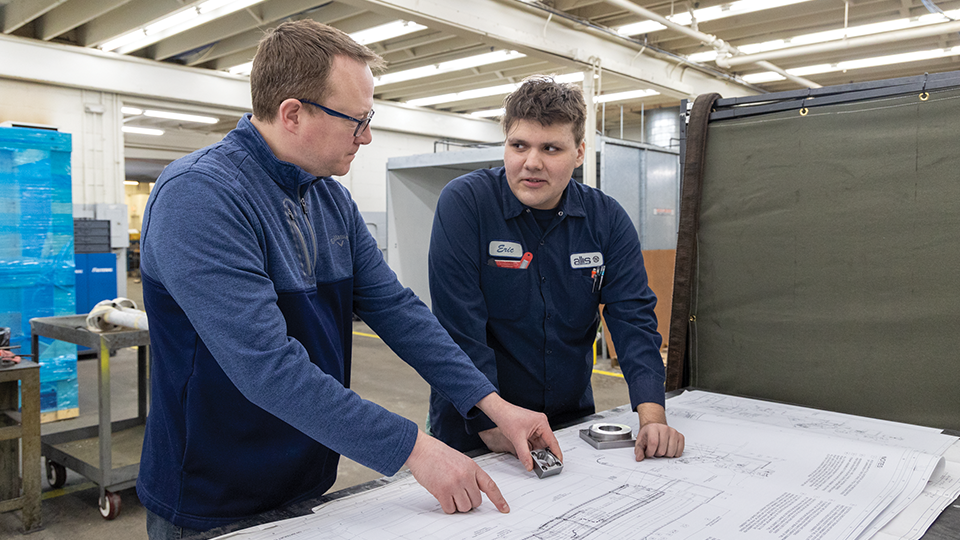With MATC and a boss who believes in him, Eric Gama proves there's a place at work for people with autism
Eric Gama is just one of the guys when he punches in at 9 a.m. and starts his day as a machining assistant at Allis Manufacturing Corp. in West Allis. He begins his scheduled tasks on one of the company's computer numerical control (CNC) machines. He reviews blueprints and programs machines that produce an array of metal parts. Sometimes he eats lunch with co-workers and talks about a few of his favorite things: his cats, world history, video games, Lego blocks.
"I love going to work," said Gama, who has autism and recently graduated from MATC's Uniquely Abled Academy (UAA). The program is designed to give students with autism the hands-on training needed to prepare for a career as a CNC operator.

Allis Manufacturing CEO and President Peter Rathmann (lef) is committed to hiring workers with autism like Eric Gama (right), who has thrived in manufacturing (above right).
Gama was in the second group of students to participate in the Uniquely Abled Academy, which started in 2021.
"Every business is looking for people who can show up on time, take pride in their work and are always asking what more they can do," said Peter Rathmann, the no-nonsense, straight-talking president, CEO and owner of Allis Manufacturing. "Eric is proving all the time that he can do that. He's committed to us, so we are committed to him."

Eric Gama has thrived in manufacturing.
A natural fit
During the summer, Gama worked six hours a day, three days a week at Allis Manufacturing. This fall, he's working as many hours as he can there while taking additional CNC grinding courses at MATC and serving as a tutor for the third cohort of students in the UAA. In the spring of 2024, he plans on taking more CNC classes.
In MATC's UAA program, students get more than 500 hours of instruction over two semesters. They learn to interpret industrial and engineering drawings, precisely measure parts so they pass inspection, perform basic machine tool equipment setup and operation, and practice machine shop safety.
UAA students also take career readiness and social skill classes, learn how to build resumes, and go on interviews. They visit prospective employers and watch employer presentations, said Goldhmong Vang, UAA coordinator at the college.
"Eric is an amazing student and has a huge interest in machining," Vang said. "We really enjoyed having Eric in our program. He flourished."
At his job, Gama has continued to grow, personally and professionally, Rathmann said. "Since he started, he has really opened up. He is a fun guy. His first day, we had him do some things to see where he was, and he was knocking out parts on Day 1."
While a student at Nicolet High School, Gama said he considered being a welder or an electrician. He had helped his father renovate a bathroom in the family home, repair a dining room ceiling and paint.
"I thought about attending a four-year college for mechanical engineering, but the more I thought about it, I realized I would be better off in a trade," Gama said.
He met with a Pathway advisor at MATC's Mequon Campus and discovered that he would be a good fit in the CNC program. He enrolled in the UAA program.
"I really enjoyed it. I was always happy to go to class," Gama said. "I learned a lot and found it fun."
Getting over the fear of the unknown is key for many businesses....If Businesses give this chance, I believe they will see the value.
Unique partnership
Gama and his family met Rathmann at the academy's completion ceremony. Gama talked with him again a few weeks later and started working in June.
Rathmann is keenly interested in neurodiverse disorders. His oldest daughter, Emma, was diagnosed with Asperger's syndrome, a form of autism, when she was 12 years old. He has helped her navigate life, secure several jobs and become more independent.
"Many places don't know what to do with these kids," Rathmann said bluntly. "They bring them in but have no ability to manage them or grow them. So they end up kind of hiding them. They might be working third shift in the stockroom."
He found out about MATC's Uniquely Abled Academy a few years before the COVID-19 pandemic and has been an ardent supporter and evangelical advocate for neurodiverse inclusion ever since.
According to the Autism Society, more than 3.5 million Americans live with autism. Many are either unemployed or underemployed.
About 100,000 people with autism live in Wisconsin, according to a May 2022 study published by the National Library of Medicine. Rathmann believes these individuals can help companies alleviate labor shortages if those businesses are willing to be flexible and accommodating.
"Getting over the fear of the unknown is key for many businesses," Rathmann said. "They need to create a committed ecosystem where leadership, management, other employees and family members are on the same page. If businesses give this chance, I believe they will see the value."

Shop manager Buddy Bree (left) and Eric Gama discuss plans for the day's work.
MATC's program is a partnership with the Uniquely Abled Project, which is based in Los Angeles and was established in 2013 by Ivan Rosenberg, an aerospace industry consultant and parent of two children with autism.
Since MATC launched the program in 2021, more than 65 private sector donors have contributed $357,000 to the MATC Foundation. In addition, the Wisconsin Technical College System awarded a two-year grant to provide seed support to launch the effort.
"Our program is another innovative approach where MATC is working to nurture the talents of individuals in our district while meeting employer demands in an industry that needs skilled workers," said Laura Bray, MATC vice president of college advancement and external communications and executive director of the MATC Foundation. "This is a clear win-win for students and employers."
Rathmann agreed. "I love what MATC has done with this program," he said. "I applaud that they have integrated it, and I will do whatever I need to do to help support it."
Find out more about MATC's Uniquely Abled Academy.

